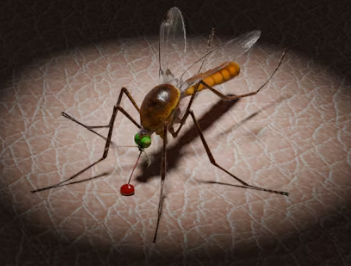Are you at risk? Deadly “bone-breaking” virus spreading across US states—here’s what you should know now
- Replies 0
Reports of a painful mosquito-borne illness are on the rise across several US states, sparking fresh warnings from health officials.
While cases have been seen before, this year’s numbers are already nearing past totals in some areas.
The condition has earned a chilling nickname for the agony it causes in muscles and joints, and in rare cases, it can be life-threatening.
Health agencies are urging the public—especially those returning from certain regions abroad—to be alert for symptoms.
Dengue fever is caused by a virus transmitted through the bite of infected Aedes mosquitoes, particularly the Aedes aegypti (also known as the yellow fever mosquito).
The nickname “break-bone fever” comes from the severe pain it inflicts—sufferers often describe the sensation as if their bones are being crushed or broken.
While most people recover, the illness can be debilitating, and in rare cases, life-threatening.

Most people infected with dengue (about 80%) won’t show any symptoms at all. But for those who do, the signs can be hard to ignore:
Without prompt medical care, severe dengue can be fatal—especially for older adults or those with underlying health conditions.
While dengue has long been a problem in tropical and subtropical regions—think Southeast Asia, South America, the Caribbean, and Africa—it’s now making headlines closer to home.
Here’s what the numbers look like so far this year:
While most are still linked to travel, the risk of local outbreaks is growing as mosquitoes carrying the virus expand their range.
Also read: Are you using the wrong mosquito repellent? Only two things actually work
Several factors are fueling the spread of dengue in the US:
There’s no antiviral medication for dengue. There is a dengue vaccine (Dengvaxia), but it’s only approved for children ages 9 to 16 who have already had a previous dengue infection and live in areas where dengue is common.
Unfortunately, the manufacturer has discontinued production due to low demand, and supplies are expected to run out by 2026—even in hard-hit places like Puerto Rico.
Also read: Something alarming is moving state to state that is prompting nationwide health alerts
The best defense against dengue is to avoid mosquito bites, especially if you’re traveling to or living in high-risk areas. Here’s how:

Have you or someone you know ever experienced dengue fever before? What precautions do you usually take to avoid mosquito bites during summer or while traveling? Do you think more should be done to make the dengue vaccine widely available in the US?
While cases have been seen before, this year’s numbers are already nearing past totals in some areas.
The condition has earned a chilling nickname for the agony it causes in muscles and joints, and in rare cases, it can be life-threatening.
Health agencies are urging the public—especially those returning from certain regions abroad—to be alert for symptoms.
Dengue fever is caused by a virus transmitted through the bite of infected Aedes mosquitoes, particularly the Aedes aegypti (also known as the yellow fever mosquito).
The nickname “break-bone fever” comes from the severe pain it inflicts—sufferers often describe the sensation as if their bones are being crushed or broken.
While most people recover, the illness can be debilitating, and in rare cases, life-threatening.

In areas where dengue is not widespread, cases are often linked to international travel. Image source: Zyanya Citlalli / Unsplash
Most people infected with dengue (about 80%) won’t show any symptoms at all. But for those who do, the signs can be hard to ignore:
- Sudden high fever
- Severe headaches (especially behind the eyes)
- Joint and muscle pain
- Nausea and vomiting
- Skin rash (often appearing a few days after the fever starts)
- Mild bleeding (such as nose or gum bleeds, or easy bruising)
Without prompt medical care, severe dengue can be fatal—especially for older adults or those with underlying health conditions.
While dengue has long been a problem in tropical and subtropical regions—think Southeast Asia, South America, the Caribbean, and Africa—it’s now making headlines closer to home.
Here’s what the numbers look like so far this year:
- Hawaii: 12 cases reported in 2025, nearly matching last year’s total already. All cases so far have been linked to international travel.
- Florida, Texas, California, and Arizona: These states are seeing locally acquired cases, meaning people are getting infected without leaving the country.
- Puerto Rico: The hardest hit, with over 2,100 cases this year alone.
While most are still linked to travel, the risk of local outbreaks is growing as mosquitoes carrying the virus expand their range.
Also read: Are you using the wrong mosquito repellent? Only two things actually work
Several factors are fueling the spread of dengue in the US:
- Global Travel: Americans traveling to and from regions where dengue is common can bring the virus back home. If a local mosquito bites an infected traveler, it can then spread the virus to others.
- Climate Change: Warmer temperatures and heavier rains (thanks in part to weather patterns like El Niño) create ideal breeding grounds for mosquitoes. This means longer mosquito seasons and a wider range for these pests.
- Urbanization: More people living close together in cities means more opportunities for mosquitoes to thrive and spread disease.
There’s no antiviral medication for dengue. There is a dengue vaccine (Dengvaxia), but it’s only approved for children ages 9 to 16 who have already had a previous dengue infection and live in areas where dengue is common.
Unfortunately, the manufacturer has discontinued production due to low demand, and supplies are expected to run out by 2026—even in hard-hit places like Puerto Rico.
Also read: Something alarming is moving state to state that is prompting nationwide health alerts
The best defense against dengue is to avoid mosquito bites, especially if you’re traveling to or living in high-risk areas. Here’s how:
- Use insect repellent: Look for products containing DEET, picaridin, or oil of lemon eucalyptus.
- Wear protective clothing: Long sleeves, long pants, and socks can help keep mosquitoes at bay.
- Stay indoors during peak mosquito hours: Mosquitoes that carry dengue are most active during early morning and late afternoon.
- Sleep in screened or air-conditioned rooms: This is especially important in areas where mosquitoes are common.
- Eliminate standing water: Mosquitoes breed in stagnant water, so empty flowerpots, birdbaths, and gutters regularly.
Key Takeaways
- Hawaii has reported 12 cases of dengue fever so far this year, all in people who travelled to regions where the virus is common, such as Asia, Africa, and South America.
- Dengue fever is spread by infected mosquitoes and can cause severe joint and muscle pain, with a risk of life-threatening complications like bleeding and shock in rare cases.
- Outbreaks in the US are mostly linked to international travel, but locally acquired cases have been reported in several states, particularly Florida, Texas, Hawaii, Arizona, and California.
- There’s no antiviral treatment for dengue, but symptoms can be managed by replacing lost fluids, and people are urged to take precautions against mosquitoes when travelling to high-risk areas.






